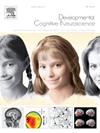Adolescent alcohol consumption produces long term changes in response inhibition and orbitofrontal-striatal activity in a sex-specific manner
IF 4.9
2区 医学
Q1 NEUROSCIENCES
引用次数: 0
Abstract
Alcohol use disorder (AUD) is strongly associated with initiation of drinking during adolescence. Little is known about neural mechanisms that produce the long-term detrimental effects of adolescent drinking. A critical feature of AUD is deficits in response inhibition, or the ability to withhold a reward-seeking response. Here, we sought to determine if adolescent drinking affects response inhibition and encoding of neural events by the orbitofrontal cortex (OFC) and dorsomedial striatum (DMS), two regions critical for expression of response inhibition. Adolescent male and female rats were given access to alcohol for four hours a day for five consecutive days. Then, rats were tested in a cued response inhibition task as adolescents or adults while we recorded concomitantly from the OFC and DMS. Adolescent voluntary alcohol drinking impaired response inhibition and increased alcohol drinking in male but not female rats. Adolescent alcohol drinking was associated with reduced excitation following premature actions in adults and increased OFC-DMS synchrony in male but not female rats. Collectively, these data suggest sex-specific effects of adolescent alcohol drinking on response inhibition and corresponding alterations in cortical-striatal circuitry.
青少年酒精消费在反应抑制和眶额纹状体活动方面以性别特异性的方式产生长期变化
酒精使用障碍(AUD)与青春期开始饮酒密切相关。关于青少年饮酒产生长期有害影响的神经机制,我们知之甚少。AUD的一个关键特征是反应抑制的缺陷,或抑制寻求奖励反应的能力。在这里,我们试图确定青少年饮酒是否影响反应抑制和眶额皮质(OFC)和背内侧纹状体(DMS)的神经事件编码,这两个区域对反应抑制的表达至关重要。研究人员连续5天,每天让青春期的雄性和雌性老鼠喝4个小时的酒。然后,在我们同时记录OFC和DMS的同时,对青少年和成年大鼠进行线索反应抑制任务测试。青少年自愿饮酒损害了雄性大鼠的反应抑制,增加了雌性大鼠的饮酒。在成年大鼠中,青少年饮酒与过早动作后的兴奋减少和雄性大鼠的OFC-DMS同步增加有关,而雌性大鼠没有。总的来说,这些数据表明青少年饮酒对反应抑制的性别特异性影响以及相应的皮质纹状体回路的改变。
本文章由计算机程序翻译,如有差异,请以英文原文为准。
求助全文
约1分钟内获得全文
求助全文
来源期刊

Developmental Cognitive Neuroscience
NEUROSCIENCES-
CiteScore
7.60
自引率
10.60%
发文量
124
审稿时长
6-12 weeks
期刊介绍:
The journal publishes theoretical and research papers on cognitive brain development, from infancy through childhood and adolescence and into adulthood. It covers neurocognitive development and neurocognitive processing in both typical and atypical development, including social and affective aspects. Appropriate methodologies for the journal include, but are not limited to, functional neuroimaging (fMRI and MEG), electrophysiology (EEG and ERP), NIRS and transcranial magnetic stimulation, as well as other basic neuroscience approaches using cellular and animal models that directly address cognitive brain development, patient studies, case studies, post-mortem studies and pharmacological studies.
 求助内容:
求助内容: 应助结果提醒方式:
应助结果提醒方式:


